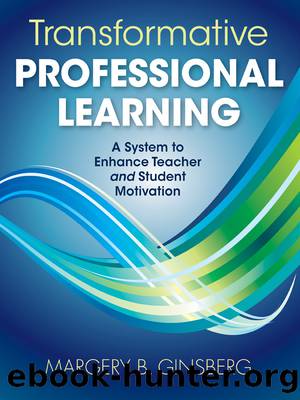Transformative Professional Learning by Ginsberg Margery B.; & Ginsberg

Author:Ginsberg, Margery B.; & Ginsberg
Language: eng
Format: epub
ISBN: 1051567
Publisher: Corwin Press
Published: 2011-08-15T00:00:00+00:00
TAKING NOTES WITHOUT INTERRUPTING YOUR ABILITY TO LISTEN WELL
One way for teachers to develop a sense of how to record observations and personal thoughts from the visit is to practice observing and taking field notes. We use a notebook that provides space for a two-column chart, noting on one side a family memberâs response to a question and on the other side the thoughts or feelings that response evokes in the interviewer. The goal is to distinguish between personal thoughts and observable data. Both of these can be informative in developing culturally relevant curriculum, but it is important to remember that teachersâ notes are filtered through their own cultural lenses. Visitors to studentsâ homes must be cautious about making assumptionsâin their notes and otherwise. While our perceptions from a single visit may be informative, they do not provide sufficient evidence to enable us to speak with certainty about the rich and complex lives of the families we visit.
Another consideration regarding note taking is that if visitors are busy taking notes, we may not be able to listen carefullyâor to observe significant interactions. For example, during one visit, a familyâs neighbors stopped by to repay childcare that the mother had provided with a homemade meal. It was clear from listening and watching that this particular apartment community had a number of ways to provide support for one another, and it was enlightening to learn from the informal exchange between neighbors about scheduling future exchanges, caring for infants, and honoring religious requirements for food preparation. Note taking would have required a visitor to miss the open opportunity to participate in the conversation. Further, writing during such an exchange would have been awkward and potentially alienating.
To fully participate in a visit, we suggest that teachers ask families if it is all right to take some notes during the conversation to help them remember clues for how they might enrich their teaching based on some of the familiesâ interests and knowledge. Many teachers also tell families that, upon request, they would be happy to share their notes.
To facilitate recall of important exchanges or observations, we also suggest that, following the visit, visitors find a quiet place such as a park or library in which to recall memorable responses to questions and interactions. Most handwritten field notes will be incomplete. Read through all data you have collected to recall whatâs there. This includes responses to interview questions and personal reflections.
Download
This site does not store any files on its server. We only index and link to content provided by other sites. Please contact the content providers to delete copyright contents if any and email us, we'll remove relevant links or contents immediately.
Competing on Culture by VanWagoner Randall;Sydow Debbie L.;Alfred Richard L.;(155)
Teaching Skills For Dummies by Sue Cowley(136)
The Art & Science of Web Design by Jeffery Veen(135)
Maker-Centered Learning by unknow(114)
People Skills by Thompson Neil(111)
Managing Unstoppable Learning by Hierck Tom;(103)
Lorange P. Learning and Teaching Business...Lessons...2022 by Unknown(102)
Motivating Defiant and Disruptive Students to Learn by Rich Korb(100)
Forces of Influence by Ende Fred;Everette Meghan;(96)
The InterActive Classroom by Nash Ron;(96)
Summarization in Any Subject by Wormeli Rick;Stafford Dedra;(94)
Connecting Through Leadership by Kullar Jasmine K.;(92)
Academic Advising and the First College Year by Jenny R. Fox; Holly E. Martin(91)
Employee of the Month by Tracey Rogers(89)
Teacher Mentoring and Induction by Portner Hal;(89)
Reflective Practice in Action by Farrell Thomas S. C.;(87)
What We Say and How We Say It Matter by Mike Anderson(85)
Leveraging Data for Student Success : Improving Education Through Data-Driven Decisions by Laura G. Knapp; Elizabeth Glennie; Karen J. Charles(85)
Teaching Behavior by Terrance M. Scott(81)
